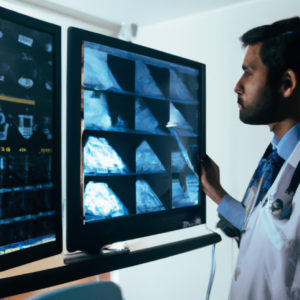Pros and Cons of CT Scanning: A Comprehensive Guide
Computed Tomography (CT) scans have revolutionized the field of medical diagnostics, providing detailed images of the body’s internal structures. However, like any medical technology, CT scans come with their own set of advantages and disadvantages. This blog aims to provide a balanced view of CT scanning, discuss trending topics related to the technology, and offer insights into its role in modern medicine.
Table of Contents
ToggleAdvantages of CT Scanning
- Detailed Imaging: CT scans offer highly detailed images of bones, blood vessels, and soft tissues, which are essential for diagnosing a variety of conditions, from fractures to tumors. According to the Mayo Clinic, the clarity of CT images makes them an invaluable tool in the early detection of diseases .
- Quick and Non-Invasive: Unlike surgical procedures, CT scans are non-invasive and can be completed quickly, often within minutes, making them ideal for emergency situations .
- Versatility: CT scans can be used to image virtually any part of the body, including the brain, chest, abdomen, and extremities. This versatility makes them a key tool in diagnosing a wide range of medical conditions, as noted by RadiologyInfo.org .
- Guidance for Treatment: CT scans are often used to guide biopsies and other minimally invasive procedures, helping doctors target the exact area that needs treatment .
- Detection of Complex Conditions: CT scans are particularly useful in detecting complex conditions like strokes, cancer, and heart disease, where precise imaging is crucial for effective treatment planning .

Disadvantages of CT Scanning
- Radiation Exposure: One of the most significant drawbacks of CT scanning is exposure to ionizing radiation. While the risk is generally low, repeated scans can increase the risk of cancer over time .
- Cost: CT scans can be expensive, especially when multiple scans are required. The high cost can be a barrier for some patients, particularly those without insurance coverage .
- Risk of Allergic Reactions: In some cases, the contrast dye used in CT scans can cause allergic reactions. This is especially a concern for patients with pre-existing allergies or kidney problems .
- Not Always Suitable: CT scans are not always suitable for pregnant women due to the potential risk to the fetus. In such cases, alternative imaging methods like ultrasound or MRI may be recommended.
- Over Diagnosis: The high sensitivity of CT scans can sometimes lead to over diagnosis, where benign or non-threatening conditions are detected, leading to unnecessary anxiety or treatment.
Trending in CT Scanning
- Artificial Intelligence in CT Scanning: AI is increasingly being integrated into CT scanning, helping to enhance image quality, reduce scan times, and assist in diagnosis. AI algorithms can quickly analyze images, identifying patterns and abnormalities that may be missed by the human eye .
- Low-Dose CT Scans: There is growing interest in low-dose CT scans, which aim to reduce the amount of radiation exposure while still providing high-quality images. This is particularly relevant in pediatric imaging and cancer screening programs .
- Portable CT Scanners: The development of portable CT scanners is another exciting trend. These devices allow for on-site imaging in locations like emergency rooms, intensive care units, and even battlefield settings, improving access to critical diagnostic tools .
- Patient-Centered Care: There’s a rising focus on patient-centered care in radiology, emphasizing clear communication about the risks and benefits of CT scanning, as well as personalized approaches to minimize radiation exposure .

CT Scan Reporting: The Role of Radiologists
The interpretation of CT scans is a critical aspect of the diagnostic process. Radiologists, specialized doctors trained in reading medical images, play a vital role in analyzing CT scans and providing accurate reports. These reports guide the treatment decisions of other healthcare professionals .
With advancements in technology, teleradiology has become increasingly popular, allowing radiologists to review and report on scans from remote locations. This has improved access to expert radiological opinions, particularly in rural or underserved areas .
CT Scan Reporting Services: Key to Accurate Diagnosis
CT scan reporting services are essential for accurate diagnosis. Skilled radiologists analyze detailed CT images and provide critical insights that guide medical treatment. With teleradiology, these services are now more accessible, allowing radiologists to review scans remotely, ensuring timely and expert analysis for better patient outcomes.
Conclusion
CT scanning is an invaluable tool in modern medicine, offering numerous benefits but also presenting certain risks. Understanding both the advantages and disadvantages is essential for making informed decisions about its use. As technology continues to evolve, new trends like AI integration and portable CT scanners are likely to further enhance the capabilities and safety of CT imaging. When comparing CT scan vs MRI, it’s important to choose the right imaging based on the specific medical needs.
